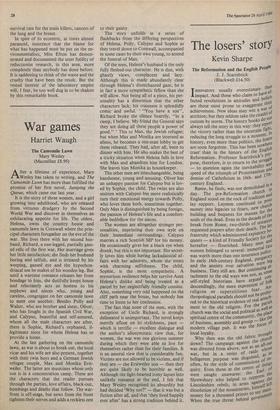War games
Harriet Waugh
The Camomile Lawn Mary Wesley (Macmillan £8.95)
After a lifetime of experience, Mary Wesley has taken to writing, and The Camomile Lawn has more than fulfilled the promise of her first novel, Jumping the Queue, which came out last year.
It is the story of three women, and a girl growing into adulthood, who are released from virtuous drudgery by the Second World War and discover in themselves an exhilarating appetite for life. The oldest, Helena, owns the country house and camomile lawn in Cornwall where the prin- cipal characters foregather on the eve of the war. She lives there with her second hus- band, Richard, a one-legged, partially gass- ed relic of the first war. Her marriage gives her little satisfaction; she finds her husband boring and selfish, and is irritated by his weeping, gassed eye and the hypochon- driacal use he makes of his wooden leg. But until a wartime romance releases her from bondage to him, she dutifully keeps house and reluctantly acts as hostess to his nephews and nieces who, young and careless, congregate on her camomile lawn to meet one another. Besides Polly and Walter, who are brother and sister, Oliver, who has fought in the Spanish Civil War, and Calypso, beautiful and self-assured, whom all the male characters are after, there is Sophie, Richard's orphaned, il- legitimate niece for whom Helena has to provide a home.
At the last gathering on the camomile lawn, as war is about to break out, the local vicar and his wife are also present, together with their twin boys and a German Jewish refugee couple, Max and Monika Erst- weiler. The latter are musicians whose only son is in a concentration camp. These are the characters that the reader pursues through the parties, love affairs, black-out, bombings and deaths that follow. The war- front is off-stage, but news from the front tightens their nerves and adds a reckless zest to their gaiety.
The story unfolds in a series of flashbacks from the differing perspectives of Helena, Polly, Calypso and Sophie as they travel down to Cornwall, accompanied in some cases by their own young, to attend the funeral of Max.
Of the men, Helena's husband is the only fully fleshed-out character. He is dim, with ghastly views, complacent and lazy. Although this is made abundantly clear through Helena's disenchanted gaze, he is in fact a more sympathetic fellow than she will allow. Not being all of a piece, his per- sonality has a dimension that the other characters lack; his crassness is splendidly comic and awful. "You have a son", Richard broke the silence heartily, "in a camp, I believe. My friend the General says they are doing all these people a power of good." ' This to Max, the Jewish refugee; but when Max and Monika are interned as aliens, he becomes a one-man lobby to get them released. They had, after all, been to dinner with him. He also makes the best of a tricky situation when Helena falls in love with Max and abandons him for London. She leaves him Monika as housekeeper.
The other men are interchangeable, being handsome, young and amusing. Oliver has an unhappy passion for Calypso but is lov- ed by Sophie, the child. The twins are also smitten with Calypso but more realistically turn their emotional energy towards Polly, who loves them both, sometimes together. Only Max is distinguished by being foreign, the passion of Helena's life and a comfort- able bedfellow for the nieces.
The women are altogether stronger per- sonalities, imprinting their own style on their immediate surroundings. Calypso marries a rich Scottish MP for his money. He occasionally gives her a black eye when drunk, but this is not important. She secret- ly loves him while having lackadaisical af- fairs with her admirers, whom she treats with charming selfishness. The child, Sophie, is the most sympathetic. A mysterious resilience helps her survive Aunt Helena's dislike and being treated as a parcel by her neglectfully friendly cousins. Also, something very odd happened on the cliff path near the house, but nobody has time to listen to her confession.
The fact that none of the men, with the exception of Uncle Richard, is strongly delineated is unimportant. The novel keeps merrily afloat on its stylishness, pace which is terrific — excellent dialogue and the author's idiosyncratic view that, for women, the war was one glorious summer during which they were able to live for themselves rather than for their families. It is an amoral view that is considerable fun. Victims are not allowed to be victims, and if they are — the Erstweiler son — then they are quite likely to be horrible as well. Although the light-hearted irony lapses into unlikely romance at the end, I felt that Mary Wesley recognised its absurdity but had decided 'Why not?' — that it was but a fiction after all, and that 'they lived happily ever after' has a strong tradition behind it.










































 Previous page
Previous page